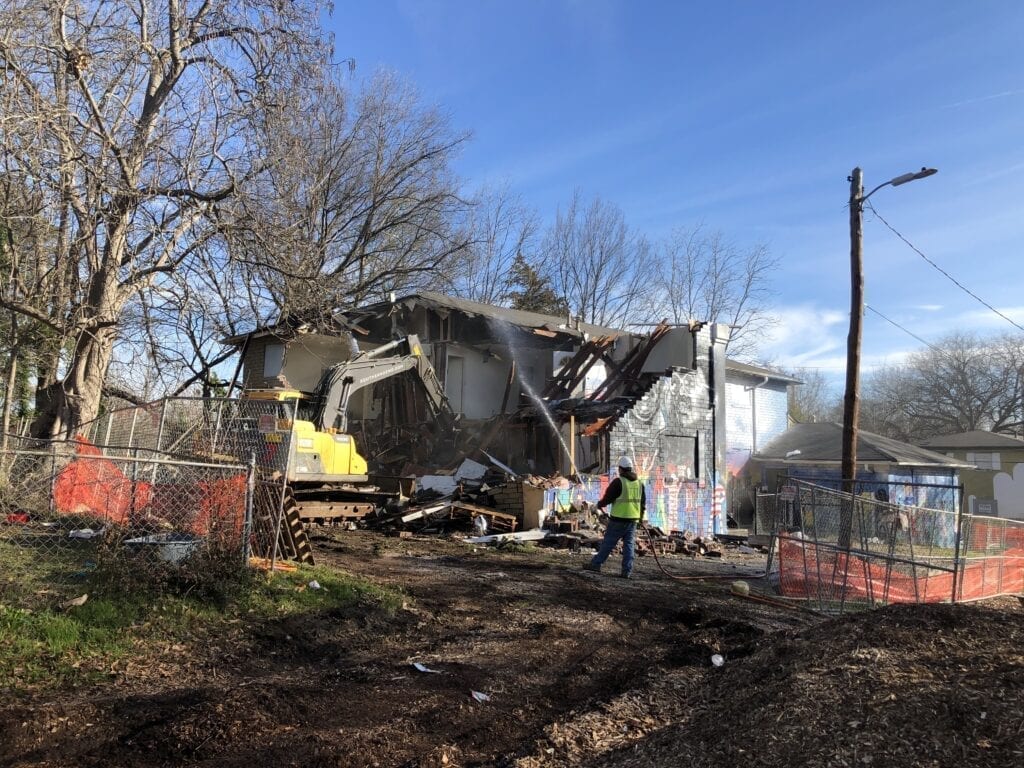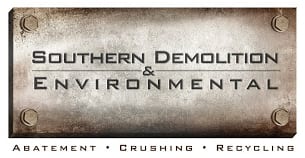
This past winter, Southern Demolition & Environmental took a lead role in a project at 612 Echo St NW, a blighted multi-family structure in the English Avenue section of Atlanta. The demolition was part of a years-long endeavor by local residents to transform a historically disadvantaged area of the city, and it marked a major step towards realizing the vision of Mattie Freeland, a community hero.
Until very recently, the small parcels of land that now make up the Mattie Freeland Greenspace functioned as an illegal dumping ground, with no active manager. Freeland lived in a small house across the street, where she often hosted small gatherings with friends and relatives, and where she was known for keeping an open door to folks who needed a place to stay or something to eat, despite her own difficult circumstances. Freeland dedicated every resource she had to improving the lives of her fellow Atlantans, and around the neighborhood, her name became synonymous with kindness, generosity, and compassion.
Shortly before her death in 2008, Freeland began talking to neighbors about how nice it would be to look outside her window and see something besides a junkyard. Her neighbors agreed; at the time, there were no public parks nearby, but within a few months, they began sweeping away the broken glass and abandoned cars. Volunteers gathered in-kind donations, put picnic tables in place, and installed playground equipment, in addition to laying soil and planting seeds for a small garden.
“They didn’t ask anyone’s permission,” says Andrew White, who works for a local nonprofit. “They just went in and created a park.”
White is director of park visioning for Park Pride, a group that helps to activate and improve greenspaces in communities around Atlanta. In 2015, the organization awarded a grant to the Friends of Mattie Freeland Park, and brought on professional landscape architectural staff to work pro bono with local residents on a long-term design.
Osaze Stigler and Muhammad Suber, two local artists from Atlanta, took a direct role in the schematic plan of the park buildout. Parishioners from the New Life Covenant Church, where Freeland was a member, partnered with the Holder Hunt Russell Moody construction consortium to adapt Freeland’s home into a community center. Meanwhile, The Conservation Fund began acquiring the lots, ensuring that the park would be permanently integrated into the city system. When complete, the Mattie Freeland Greenspace will include space for a multiuse field, improved benches and furniture, multiple play areas for children, and an outdoor pavilion. Over the past few years, the area has become a popular spot for block parties, concerts, karaoke, and a farmer’s market. The most recent event, this past winter, was a ceremonial lighting for a community Christmas tree.
Like so many communities across the country, residents have had to rethink their approach to public gatherings over the past few months. But they cleared a major hurdle with the demolition of 612 Echo Street, which for years had been a magnet for crime.
“Knocking down that building made it so that people had nowhere to hide,” explained Billie Walker, the official park ambassador. A homeowner and mother of two, who has lived in the neighborhood for nearly thirteen years, Walker said that families now feel safer taking their kids out to play.
“People here need and deserve a place to be able to congregate,” Walker said, describing how the building removal has improved the overall atmosphere around Church Avenue. “This lets the parents know that the park is coming.”
